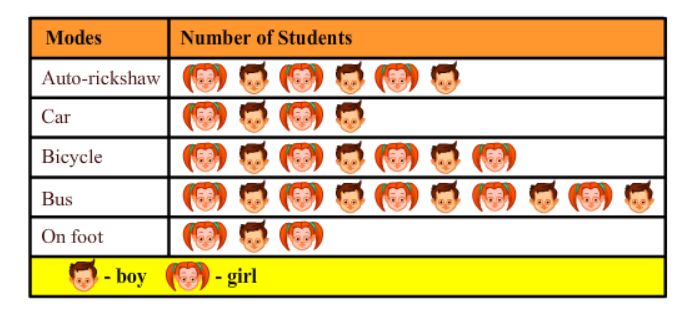Pictographs for grade 4 with examples
-
Pictograph is the representation of the set of data using images or symbols.
-
Each image or the symbol should be of same shape and size.
-
Each image or the symbol of the pictograph represents the frequency of the object in the set of data.
-
A key is mentioned in the pictograph which tell us what the image or the symbols represents.
-
Below are the pictograph images representing the favorite fruits of 30 students, showcasing their preferences in a clear, visual format.
Interpret the Pictograph
-
The title of the pictograph tells us what the data is about.
-
The key represents the data value of each symbol or the images.
-
The pictograph image given below shows the data of the number of apples sold in 5 days.
From the graph it can be observed that:
-
Maximum symbols of apples are on Friday. Therefore, maximum number of apples were sold on Friday.
-
Minimum symbols of apples are on Tuesday. Therefore, minimum number of apples were sold on Tuesday.
-
The key of the pictograph is: 1 symbol of apples = 2 apples sold.
-
Number of symbols on Monday are 6.
Value of each symbol = 2 apples sold.
Therefore, number of apples sold on Monday = 2 × 6 = 12 or it can be calculated by adding 2 six times, i.e.,
2 + 2 + 2 + 2 + 2 + 2 = 12 -
Number of apples sold on other days can be calculated in the similar way.
Advantage of Pictograph
-
It is easy to read and understand the data.
-
For drawing a pictograph much information is not required.
-
It requires only the information about the object and its frequency to construct a pictograph.
How to make a Pictograph?
These are the steps to be followed :
Pictograph Example:
Given below is the data of the favorite subjects of the group of students.
|
Subjects |
Number of Students |
|
Maths |
15 |
|
English |
24 |
|
Hindi |
6 |
|
Science |
21 |
Draw a pictograph to represent the data and answer the following question:
-
Which subject is liked by the maximum number of students?
-
Which subject is liked by least number of students?
-
How many more students like science than Maths?
Solution:
The pictograph is:
-
The graph shows that the maximum number of students liked English.
-
The graph shows that Hindi is liked by the least number of students.
-
Number of students who liked Science = 21
Number of students who liked Math = 15
Subtract 15 from 21 to get the difference.
21 – 15 = 6
Therefore, 6 more students liked Science than Maths.
What is a Pictograph in maths?
Quizz:
The following pictograph shows the number of balloons liked by students.
How many orange balloons are liked by students ?
Take a look at the Pictograph given below:
A .3
B. 7
C. 8
D. 6
Answer : d
The following pictograph shows the different modes of transport used by the students of a class to go to school.
How many boys use car to go to school?

A. 2
B. 3
C. 8
D. 6
Answer : A
Real Life Pictograph Example :A simple real-life example of a pictograph for kids is showing **the number of toys each child has**. If each teddy bear picture represents 1 toy, the pictograph might look like this:
- 🧸🧸🧸 for Sam (3 toys)
- 🧸🧸 for Mia (2 toys)
- 🧸🧸🧸🧸 for Leo (4 toys)
- 🧸 for Ava (1 toy)
This pictograph helps kids see who has the most or fewest toys just by looking at the teddy bear pictures.
Good Questions to ask your kids:
- How many toys does Sam have according to the pictograph?
- Who has fewer toys, Mia or Leo?
- If each child gets one more toy, how many toys will Mia have then?
FAQs
What type of data is used for a pictograph?
In math, a pictograph (or pictogram) is a way to show data using pictures, icons, or symbols. Each picture or symbol represents a certain amount of data, making it easy to see how often something happens. This helps us quickly understand and compare information.
What is the purpose of pictographs?
A pictograph uses pictures to show data. However, it can be harder to see exact numbers with a pictograph, so it's important to use it carefully to avoid confusing or misleading information.
What is the main advantage of the pictograph?
Here are some key advantages of using pictographs: They make large amounts of information easy to understand. Pictographs are quick to read since all the data is shown at a glance, and they are widely understood without needing extra explanation.
What is a pictograph with an example?
A pictograph, also called a pictogram, shows data using pictures or symbols. Each picture can represent one or more items. For example, the table below shows how many refrigerators a seller sold each month from October to December.

